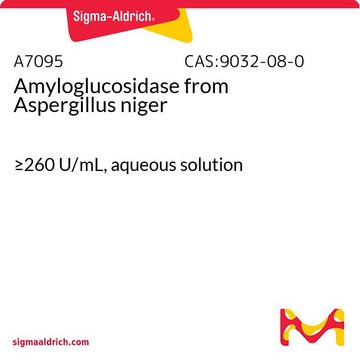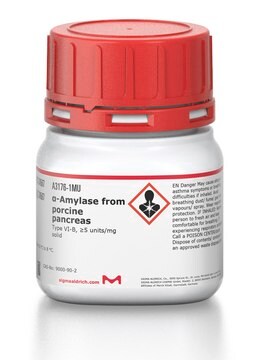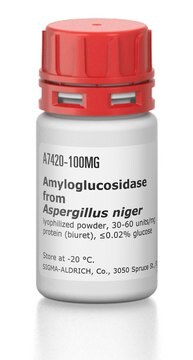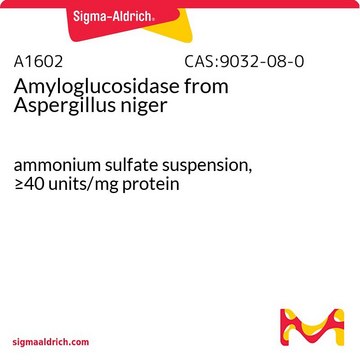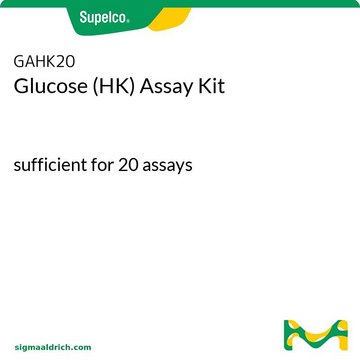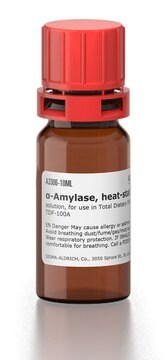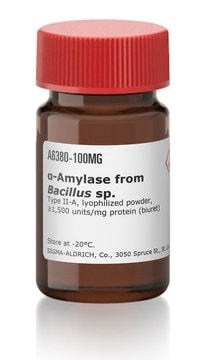Wszystkie zdjęcia(1)
Kluczowe dokumenty
ROAMYGL
Roche
Amyloglucosidase
from Aspergillus niger
Synonim(y):
Glucoamylase, disaccharidase-type-α-D-glucosidase
Zaloguj sięWyświetlanie cen organizacyjnych i kontraktowych
About This Item
Polecane produkty
pochodzenie biologiczne
Aspergillus niger
Poziom jakości
Formularz
suspension
aktywność właściwa
~14 units/mg protein (At 25 °C with glycogen as the substrate; standardized with BSA.)
masa cząsteczkowa
Mr 97 kDa
opakowanie
pkg of 10 mL (10102857001 [100 mg])
producent / nazwa handlowa
Roche
Parametry
55 °C optimum reaction temp.
optymalne pH
4.6-4.8
temp. przechowywania
2-8°C
Powiązane kategorie
Opis ogólny
Amyloglucosidase is synthesized by several Aspergillus genus species. It is a disaccharidase–type α-glucosidase. This enzyme is an exo-enzyme and one of the major industrial enzymes. The stability of amyloglucosidase can be increased by immobilization.
Specyficzność
Cleaves terminal glucoses that are α1,4- or α1,6-linked to an oligo- or polysaccharide of multiple glucose units. The product is D-glucose.
Heat inactivation: Heat inactivation is recommended at 80 °C for 45 minutes, followed by rapidly cooling down.
Heat inactivation: Heat inactivation is recommended at 80 °C for 45 minutes, followed by rapidly cooling down.
Zastosowanie
Amyloglucosidase from Aspergillus niger can be used for the hydrolyzation of terminal α1,4- and α1,6-glucosidic bonds (glucose-glucose bonds) in polysaccharides (e.g., starch, dextrins, glycogen), removing glucose units sequentially from the non-reducing end of the molecule. The enzyme will also cleave maltose and maltosides (maltotriose, maltotetraose, etc.).
Działania biochem./fizjol.
Amyloglucosidase from Aspergillus niger is capable of hydrolyzing the α-D-(1-4), the α-D-(1-6), and the α-D-(1-3) glucosidic bonds of oligosaccharides. Amyloglucosidase is an extracellular enzyme that converts starch to dextrins and glucose. The enzyme is used in the starch-processing industry for the commercial production of D-glucose from corn syrups.
Definicja jednostki
Unit Conversion: One unit (+25 °C; glycogen as substrate) corresponds to 8.6 U (+60 °C; starch as substrate).
Postać fizyczna
Suspension in 3.2 M ammonium sulfate solution, pH approximately 6
Inne uwagi
For life science research only. Not for use in diagnostic procedures.
Ta strona może zawierać tekst przetłumaczony maszynowo.
Kod klasy składowania
12 - Non Combustible Liquids
Klasa zagrożenia wodnego (WGK)
WGK 1
Temperatura zapłonu (°F)
does not flash
Temperatura zapłonu (°C)
does not flash
Wybierz jedną z najnowszych wersji:
Masz już ten produkt?
Dokumenty związane z niedawno zakupionymi produktami zostały zamieszczone w Bibliotece dokumentów.
Klienci oglądali również te produkty
Recent Advances in Basic and Applied Aspects of Industrial Catalysis (1998)
A A Amirul et al.
Folia microbiologica, 41(2), 165-174 (1996-01-01)
A. niger produced alpha-glucosidase, alpha-amylase and two forms of glucoamylase when grown in a liquid medium containing raw tapioca starch as the carbon source. The glucoamylases, which formed the dominant components of amylolytic activity manifested by the organism, were purified
High-potency amyloglucosidase-producing mold of the Aspergillus niger group.
Smiley KL, et al.
Applied Microbiology, 12(5), 455-455 (1964)
Nicholson N.
Biodiversity: New Leads for the Pharmaceutical and Agrochemical Industries (2000)
Recent Advances in Basic and Applied Aspects of Industrial Catalysis (1998)
Nasz zespół naukowców ma doświadczenie we wszystkich obszarach badań, w tym w naukach przyrodniczych, materiałoznawstwie, syntezie chemicznej, chromatografii, analityce i wielu innych dziedzinach.
Skontaktuj się z zespołem ds. pomocy technicznej